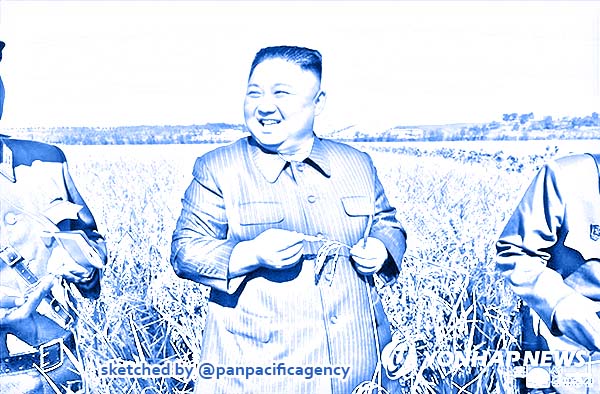S. Korea’s Unification minister rejects reports of Kim Jong-un’s illness as ‘fake news,’ ‘infodemic’

North Korean leader Kim Jong-un smiles during a visit to a military farm in this photo released by the Korean Central News Agency on Oct. 9, 2019. The visit marked Kim's first public appearance since the breakdown of working-level nuclear talks with the United States in Sweden on Oct. 5. (Yonhap). Sketched by the Pan Pacific Agency.
SEOUL, Apr 28, 2020, Yonhap. Unification Minister Kim Yeon-chul on Tuesday rejected unconfirmed reports of North Korean leader Kim Jong-un’s illness as “fake news” and “infodemic,” insisting he can say confidently there have been no unusual signs in the communist state, Yonhap News reported.
Speculation about Kim’s health spiked after he skipped an annual visit to the mausoleum of his grandfather Kim Il-sung on the late national founder’s April 15 birth anniversary, the North’s most important national holiday.
Media reports have since speculated that Kim might be seriously ill, but Seoul officials have disputed the reports, repeatedly saying there are no unusual signs found in North Korea and that Kim is believed to be staying in the country’s eastern coastal town of Wonsan.
“It can be seen as a phenomenon of infodemic,” Minister Kim said during a parliamentary foreign affairs committee meeting, referring to a recent deluge of unfounded rumors about the leader’s heath. “We have intelligence capacity that allows us to say confidently that there are no unusual signs.”
CNN reported last week that the United States is looking into intelligence that Kim is in “grave danger” after surgery. That came after a report by Daily NK, a South Korea-based news outlet specializing in North Korea issues, that Kim was receiving medical treatment outside Pyongyang following a cardiovascular procedure.
The minister called those reports “fake news” based on unconfirmed information.
“I know that the CNN report is based on the Daily NK report, which said that (Kim) received surgery at the Hyangsan Medical Center,” he said. “That cannot make sense logically. … The Hyangsan Medical Center is like a clinic, a facility incapable of performing surgery or medical procedures.”
He added that Kim’s apparent skipping of a visit to the Kumsusan Palace of the Sun last week can be understood in line with Pyongyang’s move to scale down commemorative events amid its nationwide fight to ward off the coronavirus pandemic.
Asked about whether Kim is staying in Pyongyang, the minister declined to comment, saying it is a matter of intelligence that cannot be disclosed.
He emphasized that the North Korean media’s continued reports on Kim’s daily routine schedule in recent days suggest that he is handling state affairs as normal.
“North Korean media outlets have put out reports related to Chairman Kim’s work since his attendance of a politburo meeting, suggesting he has been carrying out state affairs in a normal way,” he told lawmakers.
Kim has stayed out of public view for about two weeks since he was last seen in a political bureau meeting of the ruling Workers’ Party on April 11, but North Korean media outlets have reported on his daily routine schedule, according to the minister.
The official Korean Central News Agency said late Monday that Kim sent a congratulatory telegram message to the South Africa president in the latest report on the leader’s management of state affairs.
Foreign Minister Kang Kyung-wha, who was also present at the parliamentary session, also downplayed the speculation over Kim’s health.
“Despite a series of recent media reports, no unusual signs have been detected inside North Korea,” she told the parliament. “We are closely monitoring the trend related to North Korea’s external policy, given the recent reshuffle of its diplomacy lineup that came on the occasion of the Supreme People’s Assembly meeting.”
The North’s state media reported on April 13 that Foreign Minister Ri Son-gwon and Kim Hyong-jun, head of the international affairs department of the Workers’ Party of Korea, have been elected as members of the State Affairs Commission, the regime’s decision-making body led by leader Kim.
Kang said that North Korea appears to have been focusing on managing internal and external affairs to prevent the spread of COVID-19.
“While it maintains it has no coronavirus patients, it has put weight on beefing up its health and medical capabilities,” she said, citing reports on the groundbreaking ceremony of a hospital in Pyongyang and the expansion of its health budget.
By Koh Byung-joon and Kim Seung-yeon